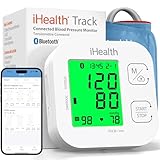Health Monitoring Devices
Curated picks for smarter shopping choices
Welcome to our guide on Health Monitoring Devices, specifically tailored for older adults. These devices can provide critical insights into your health, enabling early detection and management of potential health issues. From blood pressure monitors to glucose meters, these tools can make it easier to maintain your health at home. This guide will help you understand their functions and choose the right device to meet your health needs conveniently from the comfort of your home.
As an Amazon Partner, we may be compensated if you make a purchase – at no additional cost to you. Last update on 2025-11-02 / Affiliate links / Images from Amazon Product Advertising API
Click here to see more on Amazon
What to Look for Before You Buy
Accuracy: The device should provide accurate readings. This can be checked by comparing the device’s readings with those from a device known to be accurate or by checking reviews and ratings.
Ease of Use: The device should be user-friendly, with a clear display and easy-to-understand instructions. It should be easy to set up, use, and interpret results.
Reliability: The device should consistently provide accurate readings. It should also be durable and able to withstand regular use.
Connectivity: Many health monitoring devices can connect to smartphones or computers to store and track data over time. Check if the device has this feature and if it is compatible with your devices.
Certifications and Approval: Check whether the device has been certified or approved by health or medical organizations. This indicates that it has been tested and meets certain standards. Devices may be FDA approved or CE certified, for example.
Smart Alternatives
Fitbit Charge 4: This advanced fitness tracker offers 24/7 heart rate tracking, sleep monitoring, and built-in GPS for tracking pace and distance during workouts. It also has a SpO2 sensor to track oxygen saturation levels in the blood, which can be helpful in monitoring certain health conditions.
Apple Watch Series 6: This smartwatch offers a wide range of health features including ECG and SpO2 monitoring, heart rate tracking, and sleep monitoring. It also features a Fall Detection and Emergency SOS for additional safety.
Garmin Vivosmart 4: This slim, smart fitness tracker blends fashionable design with comprehensive health monitoring. Features include advanced sleep monitoring, pulse ox sensor, stress tracking, and VO2 max to measure cardio fitness level.
Performance and Ease of Use
Health monitoring devices typically offer reliable performance and ease of use. These devices are designed with user-friendly interfaces that allow individuals to track their wellness metrics accurately and conveniently. They deliver consistent and precise readings of various health parameters such as heart rate, blood pressure, sleep quality, and more. Their portability and non-intrusive designs make them ideal for continuous monitoring. Furthermore, many health monitoring devices can be seamlessly integrated with smartphones and computers, providing users with real-time insights and trend analysis of their health data. Overall, the performance and user experience offered by these devices are instrumental in promoting proactive health management.
Smart Pros and Real Trade-offs
Pros:
Early Detection: Health monitoring devices can provide early detection of potential health issues, allowing for preventative care and early treatment.
Convenience: These devices allow users to monitor their health at home without needing a regular doctor’s visit, making it simpler and more convenient.
Data Tracking: Health monitoring devices can track and record health data over time, providing valuable insight into a user’s overall health and potential changes.
Cons:
Accuracy: Depending on the device, the accuracy of health monitoring devices can vary significantly. This can lead to misinterpretation of data and potentially harmful health decisions.
Dependence: Over-reliance on health monitoring devices can lead to neglect of regular check-ups with healthcare professionals, potentially missing important health issues that the device can’t detect.
Who This is Smart For
Elderly Individuals: These individuals might have various health conditions that require continuous monitoring. Health monitoring devices can help them keep track of their vitals and alert caregivers or medical professionals in case of any abnormalities or emergencies.
Chronic Disease Patients: People suffering from chronic diseases like diabetes, heart disease, or respiratory conditions can greatly benefit from health monitoring devices. These devices can continuously monitor their health parameters, helping them manage their condition better and avoid any potential health crises.
Fitness Enthusiasts: Health monitoring devices also benefit individuals who are into fitness or sports. These devices can monitor their heart rate, calories burned, sleep patterns, etc., helping them track their progress and achieve their fitness goals.
Postoperative Patients: Patients recovering from surgeries or serious medical procedures can use health monitoring devices to continuously monitor their vitals. This helps in early detection of any potential complications and ensures a safe recovery process.
Pregnant Women: Health monitoring devices can help pregnant women monitor their heart rate, blood pressure, and other vital signs. This can help ensure the mother’s and the baby’s health during pregnancy.
Our Smart Take
Making a smart purchase isn’t about spending more — it’s about knowing what matters most to you. With the right info, even small decisions can bring big value.
Last Updated on November 2, 2025 by ingmin



